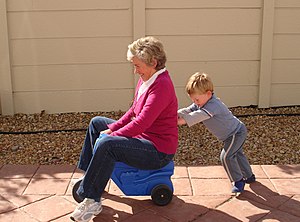
Maternal Instinct is a Myth (Source: HuffPost)
I’ve recently had the pleasure of working with Amy Blackstone (University of Maine Sociology Professor and non-momma blogger at we’re {not} having a baby!) as a International Childfree Day panelist. If you’re casting around for a childfree choice mentor, I suggest you check her out. You can start with her website (werenothavingababy.com) or find her on Facebook (facebook.com/WereNotHavingABaby) and Twitter (@nothavingababy).
I’m currently reviewing 2018 childfree nominations (so many outstanding people and organizations!) and an interesting trend sent me back to a May 2017 article that Amy published on HuffPost that tackled the “maternal instinct” trope.
If women were really born with a maternal instinct, we would see birth rates stay the same through the years. Even the feminist movement of the 1960s and ‘70s that expanded educational and workforce opportunities for many women shouldn’t change which women decide to be parents. But childfree adulthood has been on the rise since then.
What we think of as maternal instinct comes from our culture rather than our nature. Children – and girls in particular – are taught from a very young age that one of the most important things they can do when they grow up is become parents… (Source: HuffPost)
It’s an excellent article, well worth a read by those of us who choose to remain childfree, but it is arguably and even more important read for those parents who struggle to understand (and accept without judgment) the fact that some of us choose not to reproduce. For this reason along it’s worth resurfacing more than an year after it was published.
But there’s something else that intrigues me.

Maternal Instinct is a Myth (Source: HuffPost)
Paternal Instinct?
In Amy Blackstone’s second paragraph excerpted above she addresses the crux of the matter. Too often we acculturate girls and young women to assume that motherhood is / should be the default. In order to fully become a woman, a baby should be born. Procreation is the ultimate fulfillment, the ultimate joy, the ultimate experience of true love.
Blackstone articulates quite clearly that this widely, consistently reinforced bias is so ubiquitous that many assume that motherhood is an instinct, hardwiring, predestination. And yet, she reminds us, this is untrue. And, it is potentially harmful.
As I weigh the merits of our 2018 nominations for Childfree Person of the Year I wonder about another possible cultural bias. Is the choice to remain childfree primarily a women’s issue? Or is it a human issue? Where do men (and other non-female adults) fit into the broader conversation of the childfree choice, overpopulation, etc? Is there a similarly socialized “paternal instinct” that silently reinforces expectations that adult males will procreate? And why do we allow women to bear the brunt of the responsibility for defending the childfree choice when male partners are obviously, necessarily part of the calculation?
A Bigger Tent
Often we are thanked for helping young women and men recognize their own agency in the procreative equation. We are even thanked for “giving permission” not to reproduce, though we certainly have no illusions about our right to give that permission. None is needed, but we’re more than happy to remind our readers that they alone can/should make the choice to parent or the choice to remain childfree.
Perhaps it is time for us to help dilate the conversation, to expand the proverbial tent so that everyone feels welcome to participate. The considerations at stake are not exclusively the domain of women and/or mothers. These are not women’s issues. They are human issues. They are profoundly important, global issues that effect all of us and that demand a more ample and inclusive and intentional path forward.
Isn’t it time we acknowledge myth and cultural bias for what they are? Isn’t it time we empower everyone to live and love and let live and let love more intentionally, more generously, more responsibly than we have in the past. Isn’t it time that we weigh questions of sustainability and overpopulation against the urge to reproduce ourselves? Isn’t it time?
I think so. I hope so.















